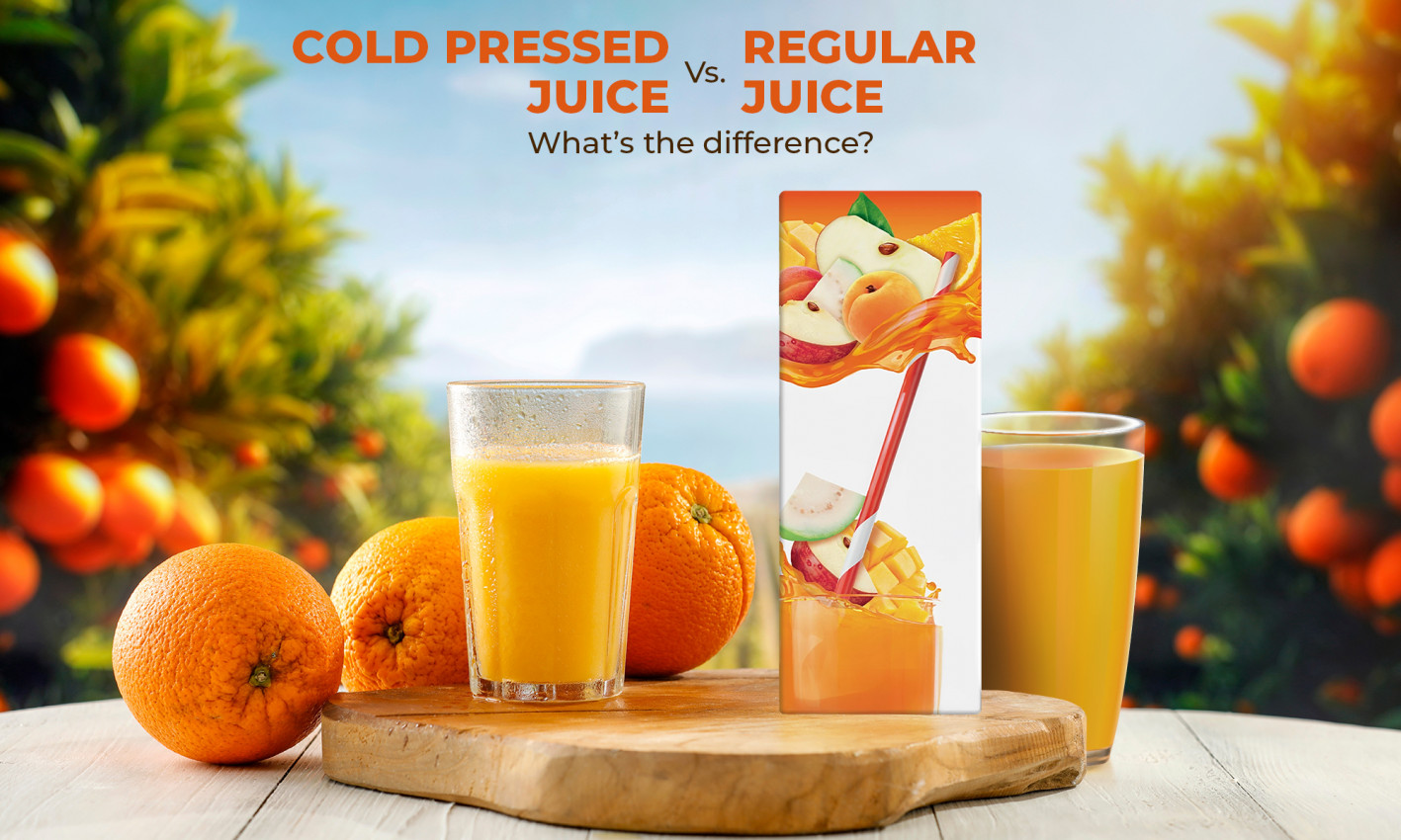
qCold-pressed juices have gained significant traction among the health-conscious community for their health profile.
India is one of the largest producers and consumers of fruit juices globally.
With popular A-listers like Gwyneth Paltrow, Demi Moore, and Alia Bhatt promoting these, people have started to wonder about the health benefits of cold-pressed juices.
At first glance, Cold-pressed juices and regular juices may seem similar!
Cold-pressed juices have substantial differences from regular juices in the method of extraction and processing, without the heat and chemicals.
Cold-pressing of juices minimizes oxidation and preserves essential vitamins, minerals, and enzymes that are often missing in regular juices.
In this blog, we’ll understand what is the difference between cold-pressed vs. regular juices.
Understanding 'Regular Juice'

Regular or conventionally available juices involve the vast amounts of juices available in the market.
These juices offer a convenient option for your daily nutritious intake and a refreshing drink!
Production Process
Your regular juices are primarily processed using centrifugal juicers, which are also the most commonly used to make juices at home.
This type of juicer rapidly spins its metal blades that work against a mesh filter to separate the juice from the pulp.
However, the rapid rotation of the metal blades in a centrifugal juicer generates heat due to friction.
Research has confirmed that significant heat produced in a centrifugal juicer can adversely impact the health-related bioactive compounds found in fruit juices, potentially diminishing their nutritional value.
Many commercially available juices are also heat pasteurized, a process that further diminishes their vitamin, mineral, and antioxidant levels, particularly vitamin C.
What are Cold-Pressed Juices?

Cold-pressed juices are unheated and unpasteurized juices extracted using a hydraulic press. Pressure is applied to extract the juice from fruits and vegetables.
As this method doesn’t use external pressure or heat, cold-pressed juices retain more nutrients than traditional juicing methods, resulting in a fresher and richer taste.
Production Process
The cold-pressing juice takes place in two stages -
This process minimizes oxidation and preserves essential vitamins, minerals, and enzymes.
Unlike centrifugal juicers that generate heat and air during extraction, cold-pressed juicers maintain the integrity of the ingredients, yielding a higher quality juice with better flavor and texture.
Organic cold-pressed juices are superiorly nutritious beverages, made with 100% certified organic ingredients, that save you from harmful pesticides and fertilizer toxins.
The Health Benefits of Cold Pressed Juices:

Cold-pressed juice offers a wide range of benefits over regular juice, which is typically produced by centrifugal juicers or bought off-the-shelf.
Cold pressing preserves more vitamins, minerals, enzymes, and antioxidants.
A comparative study between Cold-pressed grapes juice and centrifugal juice showed that the cold-pressed juice retained more anti-oxidants.
The crushing and pressing of fruits and vegetables without the application of heat leads to greater retention of natural nutrients.
Note: Cold-pressed juices contain natural sugars! Consult your physician before making any drastic changes to your diet if you are allergic, diabetic, or suffer from chronic blood sugar diseases.
The slow extraction of cold-pressing results in a richer, more vibrant flavor of juices.
Since the pulp of the fruit/vegetable is allowed to be squeezed in Cold-pressing, it is bound to offer a better in-depth taste and top-notch flavor.
Cold-pressed juices maintain a fresh taste from their original ingredients, without the alteration from oxidation and heat.
Since cold-pressed juices do not harbor additives and oxidation, they can be stored for longer periods (up to 72 hours) without significant degradation in quality or nutrients.
On the other side, centrifugal juices are to be best consumed after juicing to avoid nutrient loss.
Cold-pressed, like this Aloe Vera juice, tastes deeper with no added sugars or other additives, making them a healthier choice of juice.
Many commercially available juices can contain added sugars, preservatives, and flavorings to extend shelf life and enhance taste, which is just unnecessary in cold-pressed juice.
The primary reason people prefer cold-pressed juices is their Hydrating nature and detoxifying ability.
Packing natural goodness in every sip, cold-pressed juices quickly absorb nutrients and antioxidants, supporting overall health.
Points to Remember:
In summary, cold-pressed juices offer significant advantages over regular juices, primarily due to their production methods that preserve essential nutrients and enzymes.
The absence of heat during extraction results in a richer flavor and higher antioxidant levels, making cold-pressed juices a healthier choice.
While they may come at a higher price point and have a shorter shelf life, the nutritional benefits and superior taste often justify the investment for health-conscious consumers.
Explore the best organic cold-pressed juices at Refresh, your one-stop shop for 100% organic essentials.
Explore more from Naturopedia
Turmeric for Immune Support: Why It’s Perfect for Cold and Flu Season
Super Health Benefits of Ragi or Finger Millet, its Nutrition and Facts!
6 Winter Fruits That Boost Immunity (And Why Seasonal Eating Matters)
December 5th, 2025Bridal Glow Routine at Home: Easy Kitchen Face Packs Every Bride Should Try
December 3rd, 2025How Ultra-Processed Foods are Fueling India’s Obesity and Diabetes Crisis
November 30th, 2025